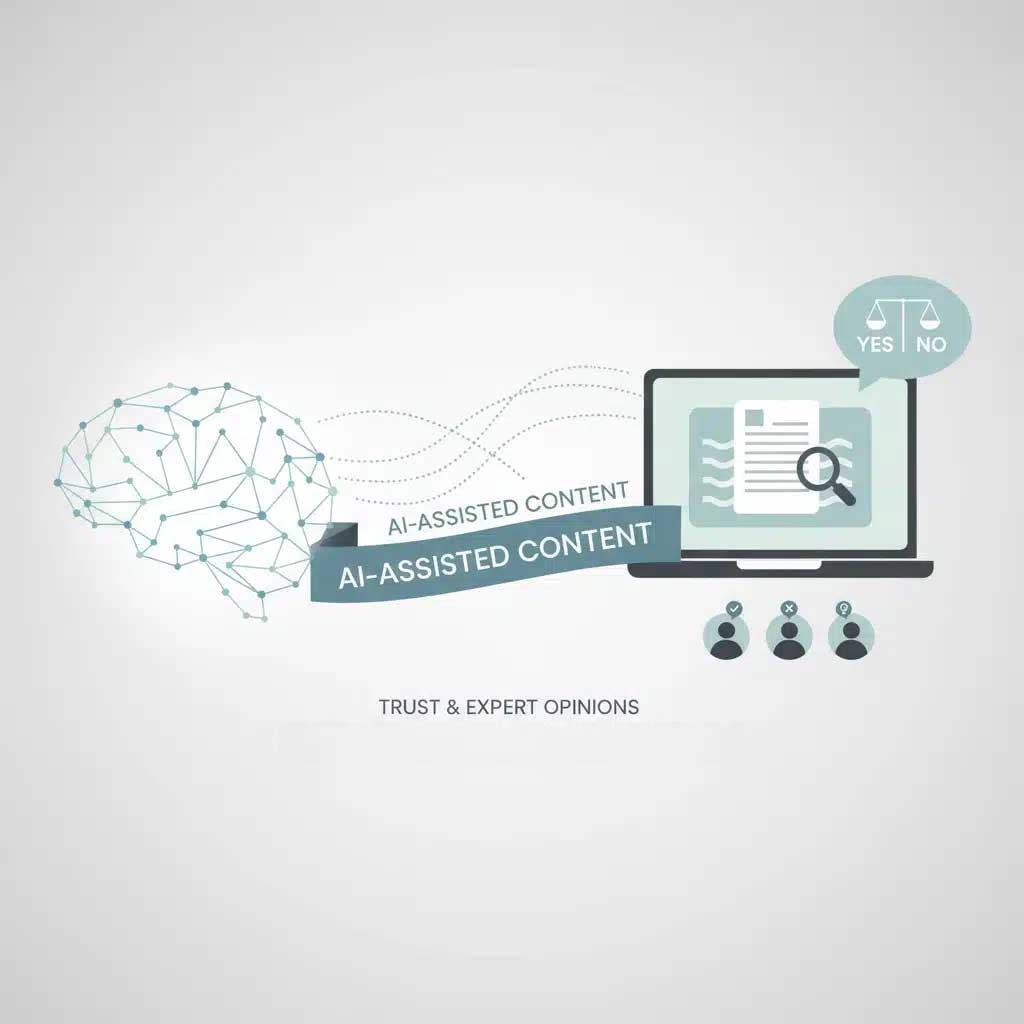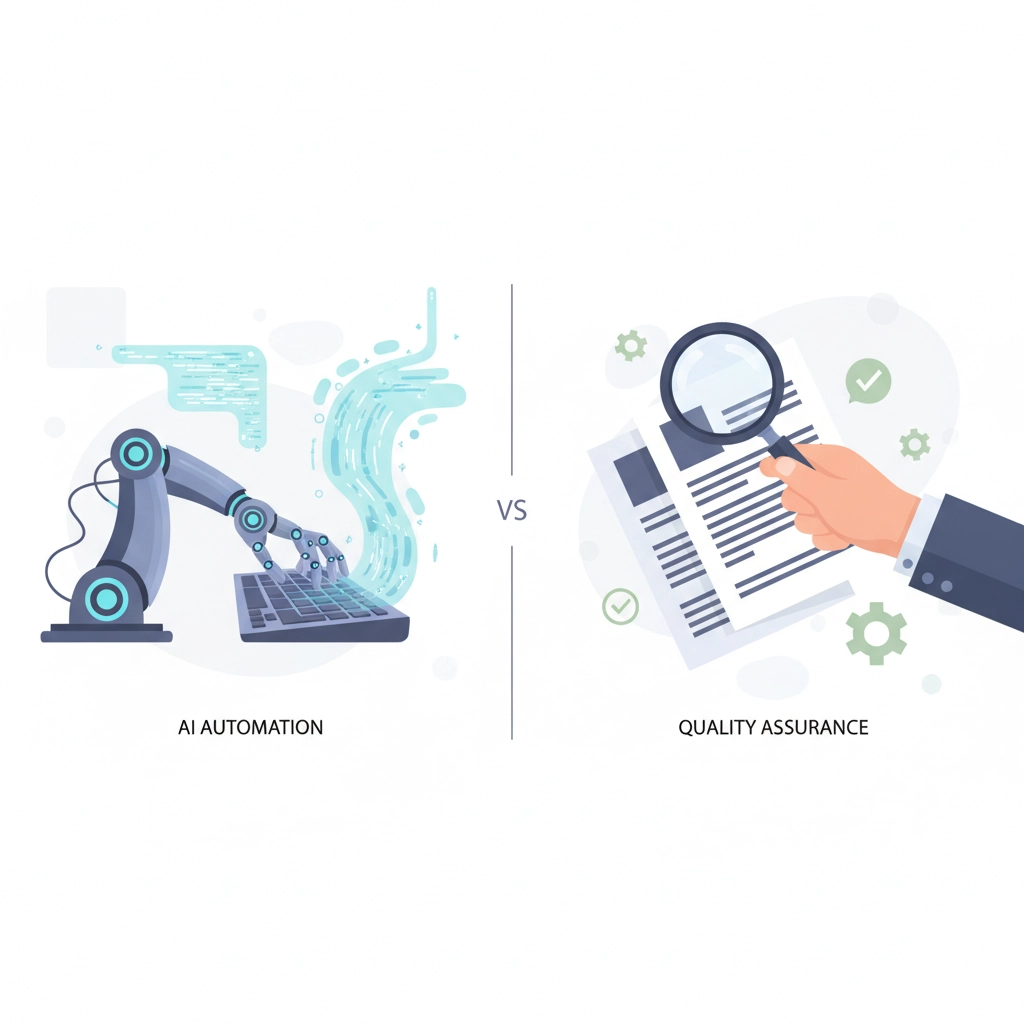Here's a sobering statistic that should grab every business owner's attention: 99.3% traffic loss. That's what happened to one company that relied too heavily on AI-generated content without proper oversight. But here's the thing: it's not AI that's the problem. It's how businesses are using it.
The content creation landscape has fundamentally changed, and there's no going back. With 93% of marketers now using AI tools for content creation, the question isn't whether you should use AI: it's whether you can trust what it's producing for your business.
The Trust Crisis: What Industry Leaders Are Really Saying
The top voices in SEO have reached a clear consensus: AI-assisted content creation can be trusted, but only with the right safeguards in place.
Rand Fishkin, co-founder of Moz and SparkToro, cuts straight to the heart of the issue: "AI can scale content production, but it often lacks the depth and authenticity that truly resonates with audiences." The key word here? Authenticity. Speed without substance is a recipe for disaster.
Google's John Mueller delivers an even more pointed warning: "AI-generated content often contains inaccuracies or lacks value. All AI-assisted texts must be reviewed and adjusted by humans to maintain quality and accuracy." This isn't a suggestion: it's a requirement for businesses that want to maintain their search visibility.
But here's where it gets interesting. Danny Sullivan, Google's public liaison for search, has been crystal clear: "Google doesn't oppose AI-generated content as long as it provides real value and isn't created merely to manipulate rankings." The emphasis on real value is no accident. Google's algorithms are designed to reward helpful, reliable information created to benefit people: not content designed to game the system.
The E-E-A-T Factor: Why Expert Oversight Is Non-Negotiable
Marie Haynes, a leading SEO consultant, emphasizes what's become the gold standard for trustworthy content: E-E-A-T (Experience, Expertise, Authoritativeness, Trustworthiness). Here's the critical insight: AI can assist with research and data analysis, but human experts must vet every output.
This is where professional SEO consulting becomes essential. A qualified SEO consulting team brings the experience and expertise that AI simply cannot replicate. They understand:
- How to structure AI-generated content for maximum search impact
- Which industry-specific nuances AI misses
- How to inject genuine authority and trustworthiness into automated content
- When AI shortcuts will backfire spectacularly
Ann Handley, Chief Content Officer at MarketingProfs, reinforces this point: "AI streamlines processes, but it cannot replicate genuine human connection. Use AI as a tool to enhance storytelling, not as a replacement for human creativity and empathy."
The Speed vs. Quality Dilemma: Finding the Sweet Spot
The promise of AI content creation is undeniable: faster production, lower costs, and the ability to scale content across multiple channels. But speed without strategy is a dangerous game.
Here's what works in AI-assisted content creation:
✓ Human-planned structure and strategy – AI executes, humans strategize
✓ AI-enhanced readability – Polish and refine, don't generate from scratch
✓ Experience-driven insights – Real expertise that AI can't fabricate
✓ Original, valuable output – Content that genuinely serves your audience
What doesn't work? The Casual case study provides a stark warning. This company used AI tools to mass-produce thousands of pages in six months. Initial results seemed promising, but Google's November 2023 core update: which emphasized E-E-A-T: devastated the site. The result? A catastrophic 99.3% traffic loss.
This wasn't an accident. Google's algorithms eventually catch up with sites that prioritize volume over value, and the penalties are severe.
The Governance Gap: Why 93% of Companies Are Playing With Fire
Here's a shocking statistic that reveals the scope of the problem: Only 7% of companies using generative AI in marketing have full governance frameworks. This means 93% of businesses are essentially operating without safety nets.
However, 63% have created basic policies governing AI use. Even a simple one-page policy can prevent major mistakes and unify efforts across teams. But policies without enforcement are just suggestions.
The companies that succeed with AI-assisted content implement these critical safeguards:
Editorial oversight protocols – Every piece of AI-generated content goes through human review before publication. Without governance, accuracy and trust quickly erode.
Quality control checkpoints – Systematic review processes that verify facts, check sources, and ensure content meets brand standards.
E-E-A-T compliance audits – Regular assessment of content to ensure it demonstrates genuine experience, expertise, authoritativeness, and trustworthiness.
The Human Element: What AI Can't Replace
The fundamental truth about AI-assisted content creation is this: the technology accelerates workflows and improves readability, but the human element: experience, judgment, and accountability: remains essential.
Professional SEO consultants bring irreplaceable value to the AI content creation process:
- Industry expertise that ensures content accuracy and relevance
- Search algorithm knowledge that optimizes content for maximum visibility
- Brand voice consistency that maintains your unique market position
- Strategic thinking that aligns content with business objectives
- Quality assurance that prevents costly mistakes and penalties
The most successful businesses treat AI as a powerful assistant rather than a replacement for human expertise. They leverage the technology's speed and efficiency while maintaining human oversight for strategy, accuracy, and authenticity.
Making AI-Assisted Content Work for Your Business
The path forward requires a balanced approach that maximizes AI's benefits while minimizing its risks. Here's your action plan:
Establish clear governance – Create written policies for AI use, even if it's just one page. Define who reviews content, what quality standards apply, and how you'll measure success.
Implement E-E-A-T standards rigorously – Demonstrate firsthand experience through personal insights and examples. Use reliable sources to substantiate claims. Include authoritative quotes from subject matter experts. Create detailed author bios with relevant qualifications.
Prioritize people-first content – Every piece of content should provide genuine value to your audience, regardless of how it's created. Ask yourself: Would this help a real person solve a real problem?
Invest in expert oversight – Partner with experienced SEO professionals who understand both AI capabilities and search algorithm requirements. The cost of expert review is minimal compared to the potential cost of traffic loss or search penalties.
The Bottom Line: Trust Through Expertise
AI-assisted content creation is trustworthy when it serves as an aid rather than a replacement for human expertise. The technology can accelerate workflows and improve efficiency, but success requires the right balance of automation and human judgment.
The businesses thriving in this new landscape aren't the ones using the most AI: they're the ones using it most strategically. They understand that trustworthy content isn't about the tools you use; it's about the expertise you bring to the process.
For Connecticut businesses looking to leverage AI content creation safely and effectively, the message is clear: embrace the technology, but don't abandon human expertise. The companies that master this balance will dominate their markets. Those that don't will join the growing list of businesses that learned the hard way that speed without strategy is a recipe for failure.
The choice is yours. But in a world where 99.3% traffic loss can happen overnight, can you afford to get it wrong?










